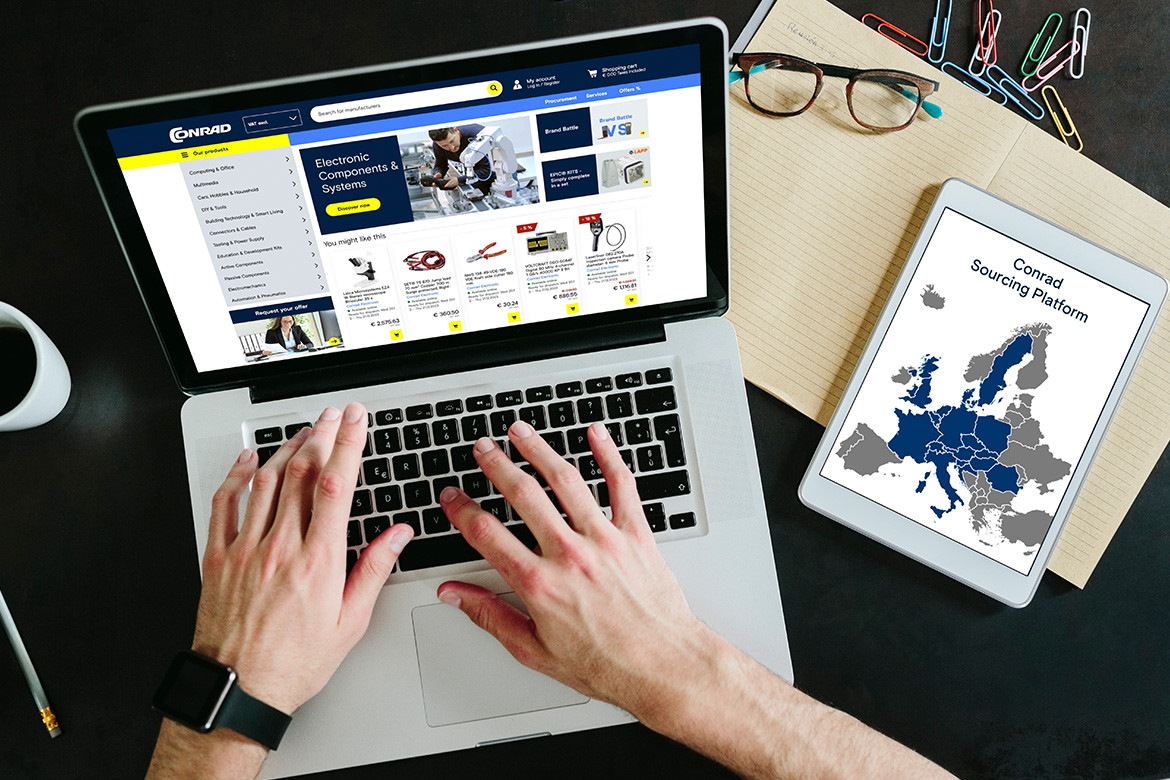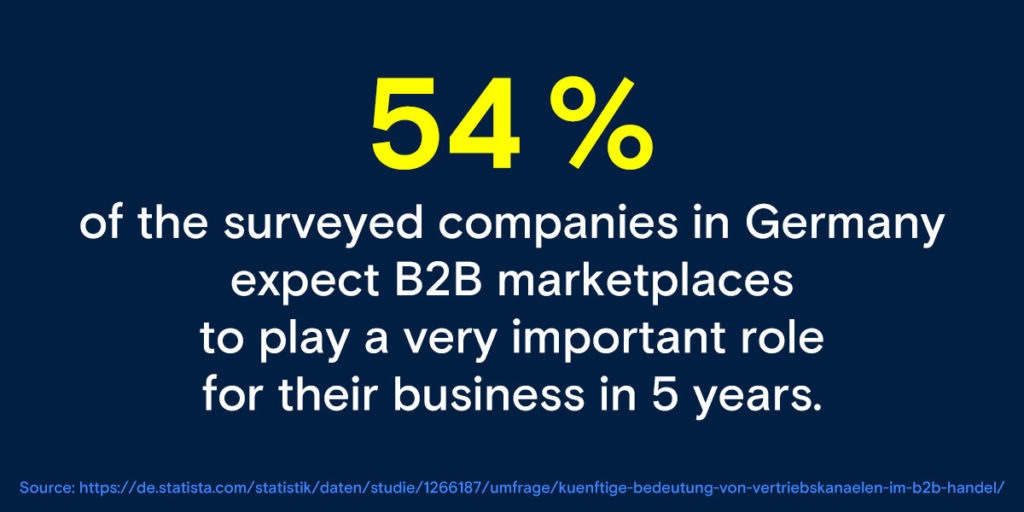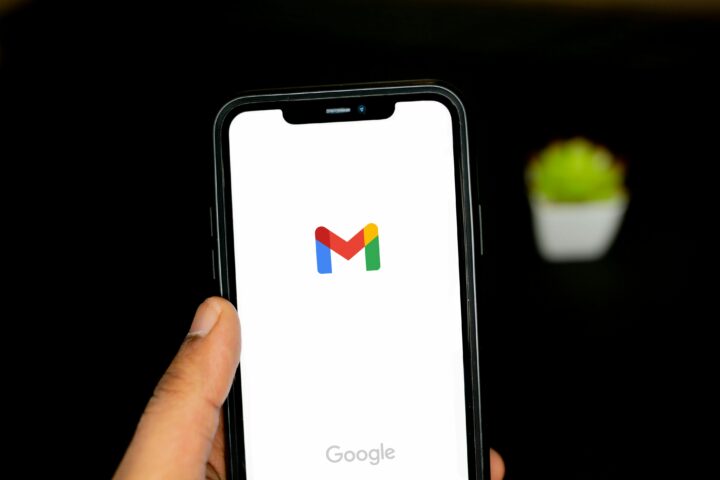B2B Marketplaces As Catalysts for Transformation Success
Written by
Editorial TeamPublished on

(Image courtesy of ©Westend61/Getty Images)
Electronics retailer turns sourcing platform: over the past years, Conrad Electronic have been shifting their focus towards e-commerce and business customers, using an online marketplace as a launchpad. In this guest column, Rado Svec, the vice president of the Conrad Sourcing Platform, looks back at what got everything started, what has been learned so far, and why, these days, just selling products doesn’t cut it anymore.
Remember 2017? Across Germany, the existence of online marketplaces operated by global companies was pretty much old news. However, at that time, only a handful of retailers were aware of the opportunities offered by this new e-commerce tool that later proved to be a game-changer for doing business online. In the technology and electronics sector, Conrad Electronic were among the earliest adopters of the new concept, setting up a B2B marketplace specifically aimed at business customers.
100 Years in Business: Transformation Is Key
A pioneering spirit, confidence and the willingness to change. These are traits that make the Conrads, a family of entrepreneurs, stand out. These traits are among the reasons why the family-owned company has been in business for 100 years. Early radio and TV, becoming a mail order company operating an EDP system, setting up an online shop – all this illustrates that, over the past century, Conrad Electronic have been at the forefront more than once when it comes to selling, and using, groundbreaking technology. The same applies to B2B business and platform economics. As early as in 1998, the company established its Conrad Business Supplies division that was all about attracting business customers and understanding their needs. About twenty years later, in May 2017, Conrad Electronics were celebrating the launch of their marketplace, thereby entering the next phase of their ongoing transformation.
B2B Is Catching Up: The Rise of Marketplaces

(Image courtesy of Conrad Electronic)
Online marketplaces are now widely used by private customers across the board. However, the B2B sector is catching up. Digital platforms offer a range of innovative ways of doing business and unprecedented potential for growth to next-gen distributors, well-known manufacturers and retailers across the board. When it comes to sales operations, online marketplaces are the future. As early as in 2021, a study carried out by Statista revealed that 54 percent of companies based in Germany expect B2B marketplaces to play a very important role for their business in 5 years’ time. Something that has been confirmed in a report by Grand View Research that quotes the global value of B2B e-commerce totalling an estimated $7.9bn in 2022. The authors also predict an annual sector growth of on average of 20.2 percent in the years from 2023 to 2030.
Place2b for B2B: Conrad Electronic Morph into a Technology Marketplace
This means that companies specialising in B2B retail need to come up with some workable e-commerce strategies. Conrad Electronic who make a point of keeping an ear to the ground were able to spot the trend towards one-stop shopping many years ago. Asking themselves how to make purchasing easier for business customers and what to do to supply a much larger range of products they came up with what is nowadays known as Conrad Sourcing Platform.
Digital Trailblazer: The First of Its Kind

(Image courtesy of Conrad Electronic)
The company’s first step towards the goal was launching an online marketplace exclusively aimed at business customers that nowadays forms an integral part of the Conrad Sourcing Platform. It took just about five months to get Conrad Marketplace up and running by May 2017 – the first of its kind in Germany’s technology and electronics retail sector. What started out as a learning-by-doing process while operating an entirely new business model seven years ago has now become a valuable pool of knowledge: The company’s innovative retailing solutions are wholly centred around what business customers are looking for to make their purchasing as comprehensive and smooth possible – which also means expanding the Sourcing Platform accordingly.
What makes a B2B Marketplace a B2B Marketplace?
Prior to the launch of their marketplace, Conrad Electronic were supplying a range of 800,000 products. These days, the Conrad Sourcing Platform lists 10 million items which includes products from 800 marketplace sellers on five different marketplaces operating in Austria, Germany, Italy, France and the Netherlands. Among them widely known names, such as One4Business owned by SONEPAR, RS Components and Kosatec Computers. Having said this, what are the drivers behind a successful marketplace? Obviously, using a marketplace needs to benefit everyone involved in some way or another. First, let’s put ourself in the customer’s shoes.
Factor #1: From a customer’s point of view, the clear benefits are a sufficient product width and depth, as well as a consistent product quality, especially in the B2B sector. This is why Conrad Electronic operate a curated marketplace model, to tailor the type of products they supply to customer needs. In other words, all manufacturers and distributors on the platform were hand-picked and went through a vetting process.
Factor #2: Customers want simple and automated procurement to streamline their purchasing processes which helps them safe time and money. This involves customised e-procurement solutions centred around specific interfaces, to suit businesses of all sizes. We’ll talk about this later.

(Image courtesy of ©svetikd/GettyImages)
Curated Product Range and Tailored Services
In what ways do marketplace sellers benefit from the set-up? Registered sellers use marketplaces first and foremost as an additional sales channel that helps them reach new audiences without having to set aside money for start-up marketing, or waiving their right to price their products. However, Conrad Electronics make sure that products offered by sellers are both in line with the type of technical supplies listed on the platform and comply with the company’s own quality standards. This is why manufacturers and distributors are hand-picked and vetted by the company before they gain access to the platform. The Conrad Business Development and Sales teams are working hand in hand to tailor product ranges to the needs of business customers. This enables the Conrad Sourcing Platform to operate as a one-stop shop for technical supplies.
In addition, Conrad Marketplace sellers benefit from tailored services, such as a detailed reporting tool that covers all major product-related KPIs including product detail page traffic, price comparison to other sellers, and individual product viewing numbers.
Next Step: Cross-border Sourcing
Conrad Marketplace being around for about seven years, and catering for over 2 million business customers in Germany alone shows that B2B markets are aware of the benefits of a sourcing platform that also incorporates a marketplace. Marketplace sellers also profit from this model in numerous ways that are largely unavailable to traditional retailers. Sellers having the option to dynamically expand their product ranges by adding certain product types gave them a big advantage during the COVID pandemic. Moreover, the easy scalability of marketplaces allows your business model going global.
At the time of writing, Conrad Electronic also operate marketplaces in Austria, Italy France and the Netherlands. All these marketplaces are open to brands and distributors based in Germany. Vice versa, sellers from the aforementioned countries are able to register on Conrad Marketplace Germany. Looking at the bigger picture a couple of years down the line, this development may be the next step towards a pan-European cross-border sourcing platform. Because for Conrad Electronic, being the trailblazer for borderless platform-based e-commerce means getting much closer to their goal, namely becoming the leading sourcing platform for technical supplies in Europe.
Don’t Just Sell Products – Be a Solutions Provider
Giving customers the option to purchase all technology and electronics products they need from one supplier is why Conrad Marketplace prioritises both product width and depth. However, it isn’t just about selling a huge number of different items. Conrad Electronic see themselves as a solutions provider who offers all parts that businesses need for a successful sourcing process. That includes solutions for companies of all sizes, and from across all sectors. In short, we are talking about e-procurement.
Automated Digital Purchasing
Highly efficient state-of-the-art purchasing operations are centred around digitalisation and automation. Using electronic sourcing set-ups or e-procurement solutions means taking things to the next level, for instance, when it comes to purchasing C-parts. It’s basically all about speeding up processes and workflows, making sure everyone involved can get any required information at a mouse click.
Save Time and Money in Procurement – This Is How It Works

(Image courtesy of ©Ivan Pantic/Getty Images)
Let’s use a real-life example here, namely a subsidiary of a utility provider whom Conrad Electronic helped implement an e-procurement solution. The new setup replaced the subsidiary’s manual and overly complex existing purchasing system which involved up to eight different procedures: (1) Subsidiary establishing the needs. (2) Subsidiary using email to request a quote from supplier. (3) Request being dealt with by supplier. (4) Quote being created by supplier. (5) Supplier emailing the quote to subsidiary. (6) Subsidiary reviewing the quote. (7) Subsidiary submitting a purchase request to parent company. (8) Parent company gathering all information necessary to place the order. Sounds like a huge hassle.
Interfaces Tailored to the Needs of Each Business
What about a solution that takes care of all that by making above costly, time-consuming and error-prone process redundant? Enter Conrad Smart Procure, a free browser-based e-procurement solution that allows teams from different company departments to place purchase orders that are all billed to a single account. Moreover, the setup features dashboards for approval workflows and purchase analysis that enable supervisors to keep an eye on things at all times.
Needless to say, that companies that operate their own ERP systems can use Open Catalog Interface (OCI) protocol to link to the Conrad Sourcing Platform. Means these customers use their systems landscape to create a web-based shopping cart and import it into their in-house procurement solution (PunchOut). Electronic Data Interchange (EDI) enables automated post-purchase communication, such as sending order confirmations, delivery notes, payment advices and invoices.
Free Up Time for Things That Really Matter
The largest benefits of electronic procurement are being able to tailor purchasing processes to your company structure, and preventing so-called maverick buying i.e. employees placing orders outside the authorised purchasing channels. Digital approval workflows based on clearly defined roles allow real-time data transfer, speed up the purchase order processing and minimise the number of errors. Over all, on average, this can reduce process costs by up to 30 percent. Which frees up time and resources to tackle the more pressing matters when it comes to the sourcing of supplies.
About the author

The author of this article is Rado Svec. He is the Vice President Sourcing Platform at Conrad Electronic.
Image courtesy of Renate Foster
About Conrad Electronic
Since 1923, Conrad Electronic have been a partner whom business of all sizes and from across all industry sectors can rely on when it comes to making the procurement of technical supplies more efficient. The Conrad Sourcing Platform ensures that customers get precisely what they need to successfully complete their projects: a range of 10 million products, customer-centric solutions, tailored services and competent advice.
More information available at conrad.de/platform


